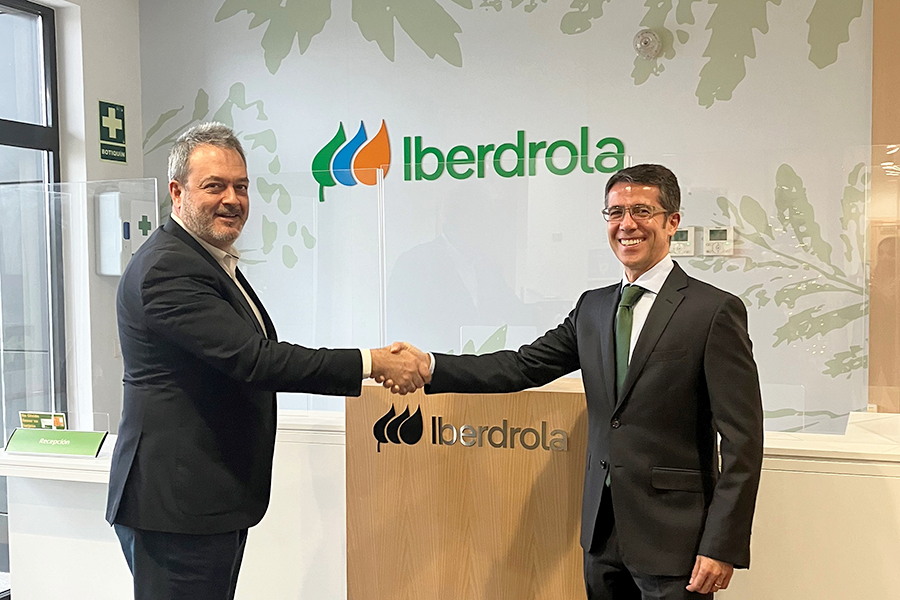Iberdrola España and COAF Palencia join forces to promote sustainable energy savings with renewable solutions
- The electricity company will provide quality solutions to members and their customers in energy matters, and in particular on the new renewable heat network that will begin implementation work in early 2024 in the city of Palencia
They will promote measures aimed at combating climate change and decarbonisation, with the objective of promoting the energy transition to more sustainable models in homeowners' communities

The commercial director of Iberdrola España in Castilla y León, Celiano García (left), ratifies the agreement with the president of COAF Palencia, Antonio Landa.
Iberdrola España and the Palencia Association of Property Administrators (COAF Palencia) will jointly promote measures aimed at combating climate change and decarbonisation, with the aim of promoting the energy transition to more sustainable models in homeowners' associations.
The electricity company will provide quality sustainable energy solutions to members and their customers, especially on the new renewable heat network it is deploying in the city of Palencia, which will enable them to save on their bills and improve their energy efficiency.
Iberdrola España will also guide COAF Palencia in other solutions such as the supply of electricity, gas and value-added services, photovoltaic self-consumption installations, electric mobility and energy rehabilitation.
The president of COAF Palencia, Antonio Landa, and the commercial director of Iberdrola España in Castile and León, Celiano García, have ratified this morning a collaboration agreement, which establishes a framework of mutual cooperation under the commitment of both entities to decarbonisation.
In the seal of the agreement, both corporations have expressed their commitment to move together towards a decarbonised economy, based on the promotion and introduction of renewable energies in homeowners' communities, where 80% of the Spanish population resides, and the implementation of a renewable heat distribution network for the supply of heating and hot water. This is a much cleaner, safer and more efficient alternative for users than those generated with gas or diesel and, furthermore, does not require any investment for the end customer as Iberdrola España assumes the investment and customers only pay for the energy consumed.
Iberdrola España deploys its first heat network in Palencia
Iberdrola España reaffirms its commitment to decarbonisation with the deployment of its first renewable heat network in Palencia. The company plans to invest around €36 million in the implementation of a heat distribution network for the supply of heating and hot water to homeowners' associations, industries and government buildings.
The heat network, for which the City Council has recently granted a fifty-year concession, will begin construction work early next year, mainly in the neighbourhoods of Pan y Guindas, Centro, Allende del Río, San Juanillo, Avenida de Madrid, San Pablo y Santa Marina, San Antonio, Santiago, Ave María and El Cristo.
"This project will serve to accelerate the decarbonisation of heating and domestic hot water (DHW) services, helping to have cleaner air in the environment and a lower energy bill in homes that is not subject to the fluctuations in the prices of fossil fuels at international level. In addition, by connecting local industry to the grid to consume heat from the network, a decisive contribution is made to energy efficiency and the circular economy", emphasises Celiano García, Iberdrola España's Commercial Director in Castile and León.
Clean energy without CO2 emissions
Consumers of this renewable heat network could save up to 20-30% on their energy bills, and the savings could be guaranteed against the system it replaces because the old system is left operational. Furthermore, the implementation of this project will prevent the emission of approximately 25,000 tonnes of CO2 per year.
The company has the support of the Ministry for Ecological Transition and the Demographic Challenge, as the initiative has been selected to receive a grant of €4.9 million from the Incentive Programme for heating and cooling network projects using renewable energy sources in competitive competition, within the framework of the Recovery, Transformation and Resilience Plan - financed by the European Union - NextGenerationEU.
This initiative is the first of an ambitious portfolio of projects that Iberdrola España is promoting in Spain and which would cover an approximate demand of more than 4 TWht/year. For its execution, in 2021 Iberdrola España set up a company called IR Redes de Calor y Frío, S.L., with Recursos de la Biomasa, S.L.U. (REBI), whose corporate purpose is the promotion, development, construction and operation of heating and cooling networks. REBI is an energy services company with recognised prestige and extensive experience in the design, management and operation of thermal installations for residential, tertiary and industrial use, and has considerable experience in the design, construction and maintenance of large heat networks, currently providing energy services to more than 10,000 homes and public buildings in its six operational networks - Olvega, Soria, Aranda de Duero, Guadalajara, University of Valladolid and Cuenca.
100% renewable energy and will supply 9,000 homes
With this first heat network in Palencia, a 100% renewable generation plant will supply 9,000 homes through this piping system of approximately 25 kilometres that will make up the impulsion/return network of the centralised installation that will connect the plant with the associated buildings and industries. The heat network will also have a 10,000 m3 storage tank that will allow production to be decoupled from heat demand.
In addition to the advantages for users, who will have an intelligent control of the buildings' energy, improving their energy rating, and will have a simpler hot water and heating system, which will improve reliability compared to traditional systems, the rest of the surroundings where it is developed and the environment will also benefit, as CO2 emissions and environmental pollution will be reduced.
